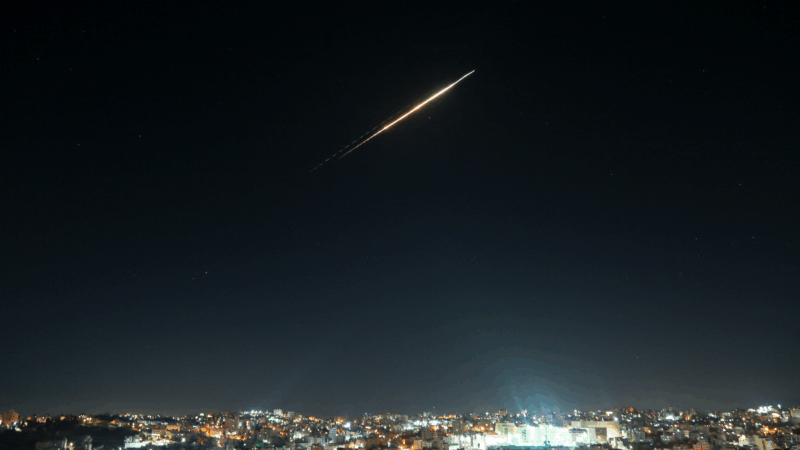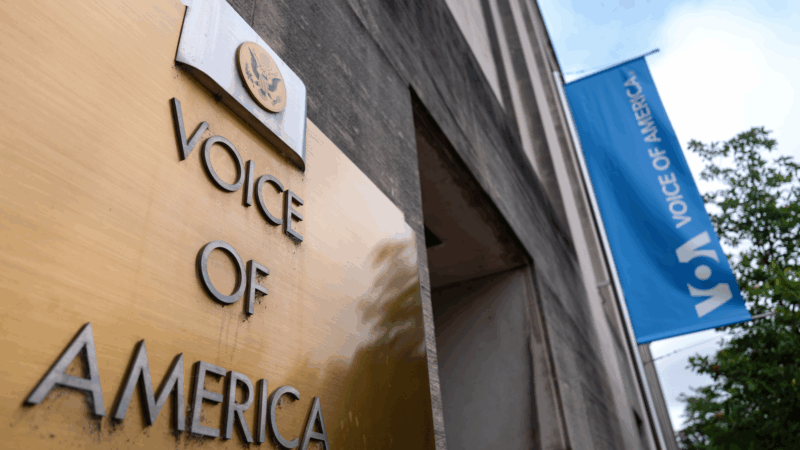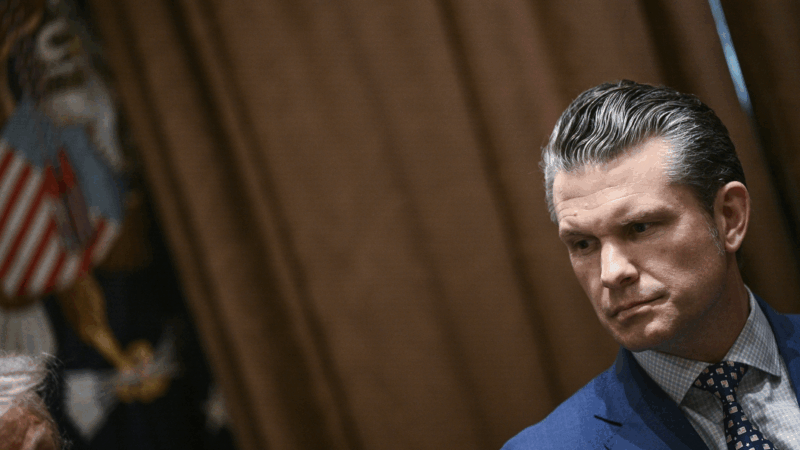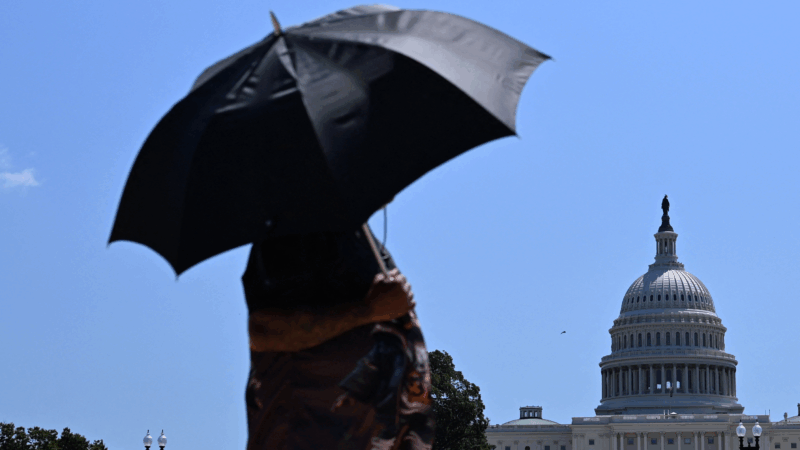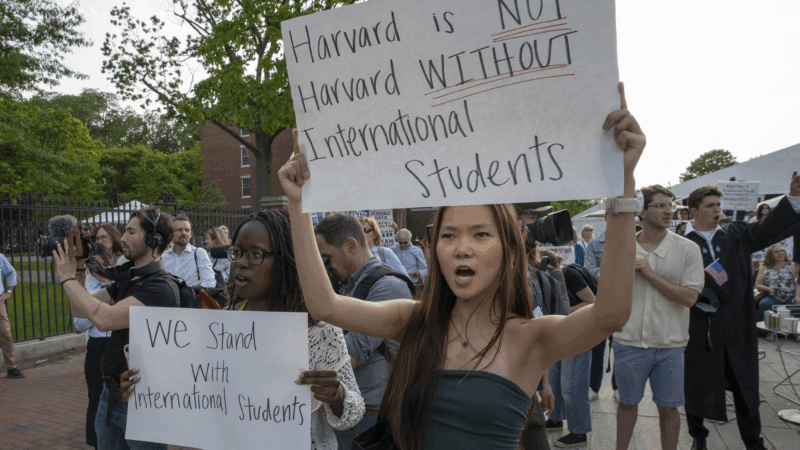Trump says he doesn’t see need for U.S. security guarantees to end Ukraine-Russia war
President Trump says he backs a key provision of the NATO alliance that requires members to come to the defense of another if attacked.
“I support it,” he said about NATO’s Article 5 provision during a press conference Thursday with British Prime Minister Keir Starmer. “I don’t think we’re going to have any reason for it.”
Trump’s comments come as the administration is working to negotiate an end to the war between Russia and Ukraine — talks that have left allies in Europe worried about the U.S. abandoning its commitments to the continent.
Thursday’s press conference followed high level meetings between the two leaders about the war in Ukraine, tariffs and a potential trade deal.
Trump expressed confidence that a peace deal between Ukraine and Russia could be reached while downplaying concerns about U.S. security guarantees for Ukraine.
“I think it’s going to happen, hopefully quickly. If it doesn’t happen quickly, it may not happen at all,” Trump said while standing beside Starmer.
As part of the broader effort to end the war, Trump said Ukrainian President Volodymyr Zelenskyy will come to Washington, D.C., on Friday to sign a critical minerals deal. Trump indicated that the deal would serve as a security “backstop.”
“I don’t think anybody’s going to play around if we’re there with a lot of workers,” Trump said about the prospect of a minerals deal bringing U.S. workers to Ukraine.
Trump voiced little support for NATO and its alliance throughout the 2024 campaign. At one South Carolina event, he said the U.S. wouldn’t defend NATO allies if they had not met NATO spending targets.
“If we don’t pay and we’re attacked by Russia, will you protect us?” Trump recalled another country’s leader asking while him while he was president. “No, I would not protect you. In fact, I would encourage them to do whatever the hell they want.”
The British prime minister was in Washington just days after French President Emmanuel Macron spent the day at the White House on Monday. The visits are part of a combined effort urging Trump to maintain U.S. support for Ukraine.
Both Starmer and Macron used a mix of praise and flattery to woo the U.S. president. Macron commended Trump for agreeing to work with Zelenskyy on a rare minerals agreement that would provide more security guarantees.
An invite from King Charles III

Starmer opened his meetings by presenting Trump with an invitation from King Charles III to visit London for a second State Visit. Trump accepted.
Starmer then credited Trump with “changing the conversation” to open the possibility for a peace deal.
He said Britain was prepared to put boots on the ground and planes to support it any agreement.
He pressed Trump and the United States to side with the Ukraine, and “not the invader.”
“There can’t be peace that rewards the aggressor,” Starmer said, referring to Russia.
Several times throughout the day, the prime minister emphasized publicly that the United Kingdom wants to make sure that any deal reached “is enduring.”
“We’ve talked and we will talk about how we work with yourself, Mr. President, to ensure that this deal is something which is not violated, because it’s very important that if there is a deal, we keep it,” Starmer said, during their Oval Office discussion.
Trump said he expected it would last.
Trump addressed the prospect of tariffs on the U.K.
The two leaders also talked about a potential trade agreement between the two counties.
“Everyone’s going to work on it, we’ll see if we can do something pretty quickly,” Trump said, noting that Vice President Vance and Treasury Secretary Scott Bessent would be leading the effort.
Starmer said the deal would concern advanced technology.
Trump also indicated that the U.S. might not impose tariffs on the United Kingdom.
When asked by a reporter whether Starmer had convinced him not to put tariffs on the UK, Trump said Starmer had tried.
“He was working hard,” Trump said, eliciting laughter from officials in the room. “I think there’s a very good chance that in the case of these two great, friendly countries, I think we could very well end up with a real trade deal where the tariffs wouldn’t be necessary. We’ll see.”
The math behind the war: Can Israel’s air defense keep up against Iranian attacks?
There's a specific kind of math that could determine just how much longer the war can go — how many long-range missiles Iran has versus how many missile interceptors Israel has to shoot them down.
Questions remain about the Minnesota rampage. Anti-abortion extremism may shed light
The suspect in the killing of a Minnesota lawmaker and her husband texted, "Dad went to war last night,' evoking the language of the far right, Christian anti-abortion movement.
Reporters for Voice of America and other U.S. networks fear what’s next
Journalists who have risked their freedom to report for Voice of America and its sister news outlets wonder what happens to them now that the Trump administration has gutted their parent agency.
Federal judge declines to order Trump officials to recover deleted Signal messages
The watchdog group American Oversight had asked a federal judge to order top national security officials to preserve any messages they may have sent on the private messaging app Signal.
Welcome to summer: U.S. braces for first significant heat wave of the new season
For many Americans, high humidity will make it feel in the triple digits. The National Weather Service is urging people to prepare to protect themselves from the dangers of extreme heat.
Trump says he’s close to ‘a Deal’ with Harvard, as judge grants injunction
Trump's Truth Social comments came as a federal judge granted a preliminary injunction that would continue blocking the president's efforts to bar international students from attending Harvard.


